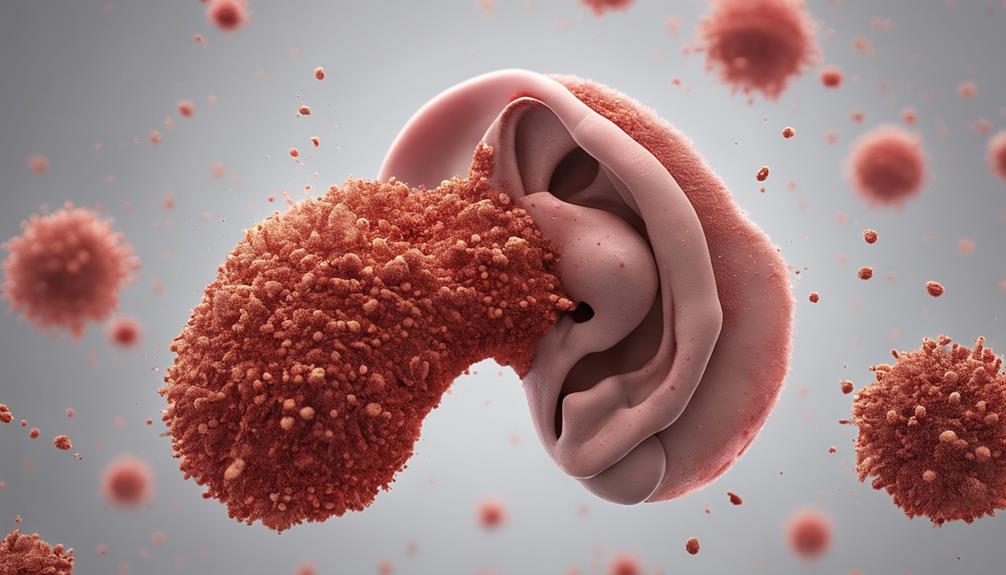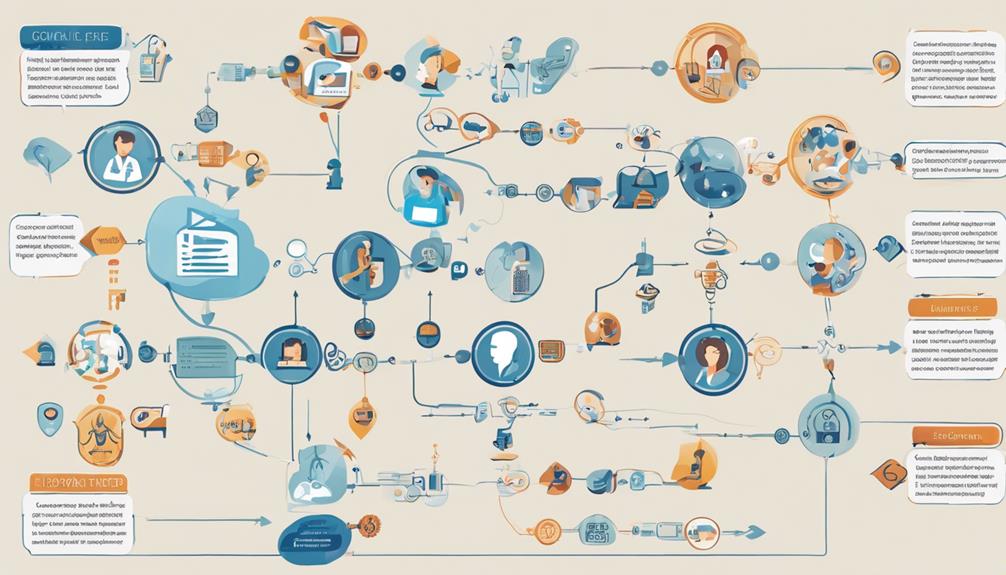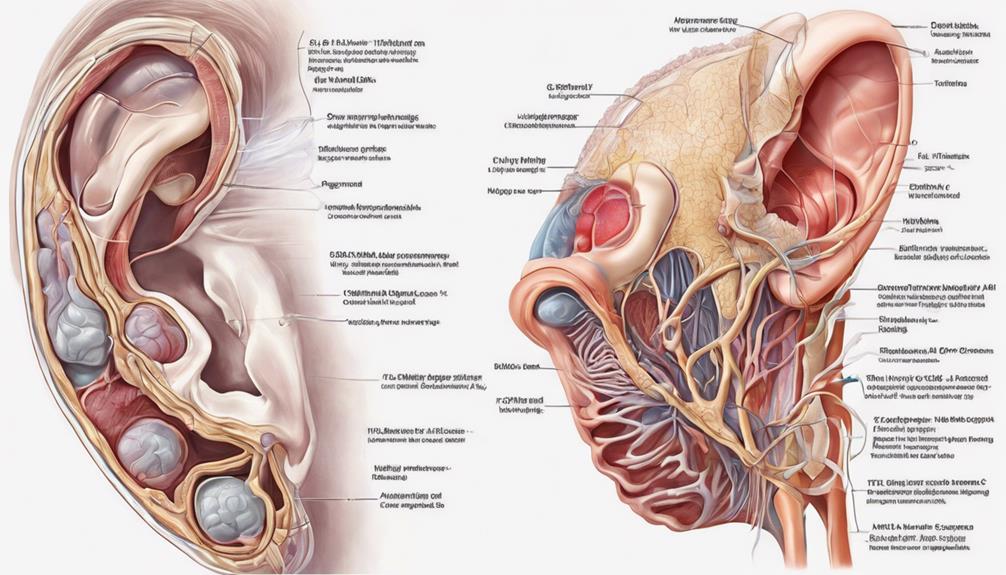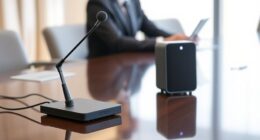Investigating the intricate relationship between allergies and hearing loss uncovers unexpected connections. The subtle yet significant effects of allergies on our auditory system are often underestimated, leading to far-reaching implications that are commonly disregarded.
By exploring the mechanisms through which allergies can lead to hearing impairment, we can uncover essential insights that may shape our approach to both allergy management and hearing health.
Key Takeaways
- Allergies can lead to conductive hearing loss by causing fluid buildup in the ear.
- Prompt treatment of allergy-related hearing issues is crucial for preserving auditory health.
- Seeking professional help is essential for accurate diagnosis and tailored treatment options.
- Allergy symptoms like pressure, itching, and fullness can indicate potential hearing issues.
Allergies and Hearing Loss Connection
Our research reveals a significant correlation between allergies and hearing loss, shedding light on the intricate connection between these two seemingly unrelated health issues. Allergies can have a direct impact on hearing by causing what's known as allergy-related hearing loss. When allergies trigger an immune response in the body, it can lead to inflammation and excess fluid production in the ear. This fluid buildup can block the transmission of sound waves, resulting in a decrease in hearing ability. Individuals may experience symptoms such as ear fullness, pressure, and itching, indicating a potential allergy-related issue affecting their hearing.
Furthermore, the Eustachian tube, responsible for regulating pressure in the middle ear, can become obstructed due to excess mucus from allergies. This blockage can disrupt the equalization of pressure, leading to difficulties in hearing and potential discomfort. Understanding how allergies can cause such hearing issues is crucial in recognizing the signs early on and seeking appropriate medical intervention to address the root cause effectively.
Types of Allergy-Related Hearing Issues

Experiencing allergies can result in various types of hearing issues, impacting individuals' auditory functions and overall well-being. Allergies can lead to conditions like conductive hearing loss, where sound waves are hindered by excess fluid or blockages within the ear. This can cause fullness, discomfort, and pressure in the ear. The Eustachian tube, responsible for regulating pressure in the middle ear, can become blocked or inflamed due to allergies, leading to mucus build-up and potential hearing loss. Furthermore, the excess fluid or earwax resulting from allergies can disrupt sound transmission to the cochlea, contributing to conductive hearing loss. Tinnitus, a ringing sensation in the ears, can also manifest alongside other allergy symptoms, further impacting one's hearing. It is essential to address these allergy-related hearing issues promptly to prevent long-term consequences and maintain optimal auditory health.
| Allergy-Related Hearing Issues | Description |
|---|---|
| Conductive Hearing Loss | Sound waves obstructed by fluid or blockages |
| Tinnitus | Ringing in the ears, may accompany allergies |
| Excess Fluid | Build-up in the ear affecting sound transmission |
Treatment and Prevention Strategies
As we focus on addressing the impact of allergies on hearing, exploring effective treatment and prevention strategies is crucial for maintaining optimal auditory health and preventing long-term consequences.
When it comes to dealing with allergies that affect hearing, there are several key strategies to consider:
- Treatment Options: Utilizing medications like antihistamines and decongestants can help alleviate allergy symptoms that may be impacting hearing.
- Regular Monitoring: Keeping a close eye on any changes in hearing and seeking early intervention can be instrumental in preventing long-term hearing damage caused by allergies.
- Proper Ear Hygiene: Maintaining good ear hygiene practices, such as keeping the ears clean and dry, can help prevent complications that may lead to allergy-related hearing issues.
- Seeking Medical Help: If allergy symptoms persist or worsen, seeking medical assistance for proper diagnosis and treatment is essential in preventing allergy-related hearing loss.
Impact of Allergies on Auditory System

Allergies significantly impact the auditory system by causing various issues such as excess mucus in the Eustachian tube and inflammation in the middle ear. This can lead to a range of complications including ear infections, conductive hearing loss, and tinnitus. Allergic reactions trigger the production of excess mucus, which can block the Eustachian tube, leading to pressure imbalances and potential hearing issues. Inflammation and fluid build-up in the middle ear can result in infections that affect the ear canal and impact hearing. Hay fever, a common allergic condition, can exacerbate these problems by causing inflammation and excessive fluid production within the ear. When left untreated, allergies can contribute to conductive hearing loss, where sound waves are obstructed due to fluid or blockages in the ear. Understanding the impact of allergies on the auditory system is crucial in addressing potential hearing difficulties.
| Allergy Related Issue | Description | Symptoms |
|---|---|---|
| Excess Mucus | Build-up in Eustachian tube due to allergies can cause pressure on the ear | Ear pressure |
| Ear Infections | Inflammation in the middle ear from allergies can lead to infections and hearing impairment | Pain, discharge |
| Conductive Hearing Loss | Allergies can result in obstructions that hinder sound conduction in the ear | Muffled hearing |
| Allergic Reactions | Allergies trigger responses that can impact the ear's functionality | Itching, swelling |
| Fluid Build-Up | Excessive fluid production due to allergies can lead to ear canal blockages | Reduced hearing ability |
Seeking Professional Help for Hearing Loss
Seeking professional assistance for hearing loss involves consulting with audiologists or ENT specialists for accurate evaluation and tailored treatment options. When addressing hearing loss due to allergies, it's essential to seek expertise from a qualified hearing healthcare professional. Here are some key steps individuals can take when seeking professional help for hearing loss:
- Comprehensive Evaluation: Audiologists can conduct thorough hearing tests to assess the extent of hearing loss caused by allergies.
- Specialized Interventions: ENT specialists can offer medical interventions or surgical procedures for specific types of hearing loss related to allergies.
- Treatment Options: Professionals can provide a range of treatment options, including hearing aids, to improve hearing function affected by allergies.
- Collaborative Care: Collaboration between healthcare providers and individuals experiencing hearing loss due to allergies is crucial for effective management and potential improvement in symptoms.
Frequently Asked Questions
How Do Allergies Cause Hearing Loss?
Allergies cause hearing loss by creating excess mucus that blocks the Eustachian tube, leading to ear pressure and potential hearing issues. Inflammation or blockages from allergies can result in ear infections and reduced hearing ability.
Allergic rhinitis, like hay fever, can trigger inflammation and excess fluid that impairs hearing. Excess fluid or ear wax due to allergies can interfere with sound transmission to the cochlea, resulting in hearing problems.
Are Allergies the 6th Leading Cause of Chronic Illness in the Us?
Indeed, allergies rank as the 6th leading cause of chronic illness in the US. With over 50 million affected Americans, allergies contribute significantly to healthcare costs and productivity losses. Chronic allergies can severely impact daily life, work performance, and overall well-being.
Understanding the prevalence and impact of allergies is vital for effective management and treatment. Allergies play a substantial role in the health landscape, warranting attention and proper care.
What Are the 3 Stages of an Allergic Reaction?
Certainly!
Allergic reactions occur in three stages: sensitization, activation, and effector response.
Sensitization marks the immune system's recognition of an allergen as harmful.
Activation triggers the release of histamine and other chemicals, leading to symptoms.
Effector response showcases allergy symptoms like itching, sneezing, and inflammation.
Understanding these stages aids in effectively managing and treating allergic reactions.
What Happens to Your Ears When You Have Allergies?
When we have allergies, our ears can be affected in various ways. Excess mucus from allergies can block the Eustachian tube, causing pressure build-up and potential hearing loss.
Inflammation and blockages in the middle ear can lead to infections, impacting our ability to hear. Allergic rhinitis can also cause fluid build-up in the ear, affecting our hearing. These issues can result in ear infections and affect the movement of the eardrum.
Conclusion
In conclusion, we've uncovered the intricate relationship between allergies and hearing loss, shedding light on the often overlooked impact of allergens on our auditory system. Armed with this newfound knowledge, we can navigate the allergen-filled world with caution and perhaps even a touch of skepticism towards our sneezy foes.
Remember, the next time you reach for the tissues, consider the potential consequences on your precious hearing abilities. Stay vigilant, dear readers, and may your ears remain clear and allergy-free.











